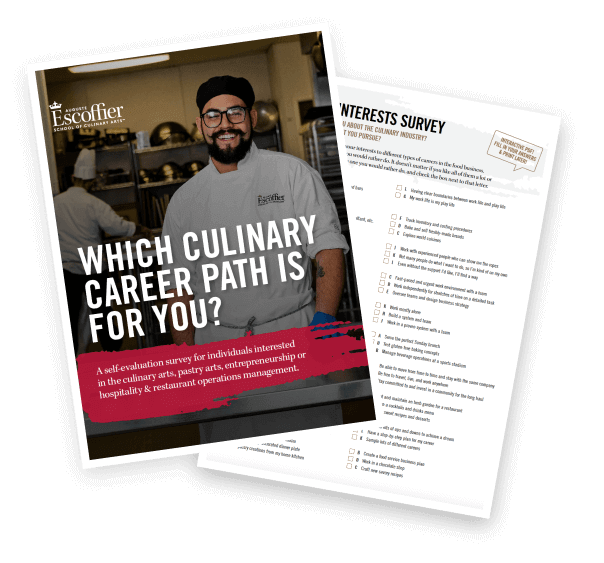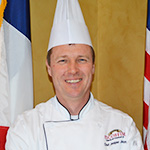The variety of unique roles and positions in the culinary industry would be hard to overstate. From restaurant chefs to chef consultants, food manufacturers to caterers, bakers to food bloggers, there’s no end to what you can do! And with the current hospitality staffing shortages in the wake of the COVID-19 pandemic, there may be more opportunities in this field than ever before.
When assessing your future career opportunities, the question of salary is bound to come up. Will you be able to support yourself and your family?
Here are five of the highest paying culinary jobs that you may want to consider after you get your education.
Private Chef
Average Salary: $66,231
Salary Range: $47,524 – $92,694 1
What Does a Private Chef Do?
A private chef cooks in-house for their client or clients.
They may work exclusively for one person or one family, usually as a full-time employee. They may even live on-premise, so they’ll be available to provide three meals per day, plus snacks.
By working as a private chef, you’ll become well acquainted with what your clients like and dislike, as well as any allergies or dietary restrictions. Working for a single family or a few families can also make the job less hectic than working in a commercial kitchen.

Skills and Experience
As you can imagine, the households that can afford a full-time chef are very high income. And if they’re paying a handsome salary to a private chef, they will have high expectations.
Private chefs must know a wide variety of cooking techniques in order to keep the menu varied and interesting for the family. But they have to remember that their responsibility is to make what the client likes, not to rely on their own favorite recipes. They may also need to be expert in substitutions if there is an allergy or dietary restriction that they have to take into account.
A degree or diploma in culinary arts can set a future private chef up for success in this culinary job. Courses such as World Cuisines can open them up to a wide variety of cuisines and traditions, while the Science of Nutrition can help them create balanced menus for their clients.
Food Service Manager
Average Salary: $56,590
Salary Range: $33,880 – $94,770 2
What Does a Food Service Manager Do?
Food service managers provide leadership and guidance in restaurants, hotels, resorts, and other large food operations. This role could also go by the job titles “Food & Beverage Director”, “Restaurant Manager”, or “General Manager.”
This is a supervisory role that ensures the smooth functions of an overall food operation. Responsibilities may include hiring and firing, implementing systems for better efficiency and customer service, and improving profitability.

Skills and Experience
This is a role for experienced hospitality and restaurant professionals. It may take a few years to work your way up to this type of managerial position.
An education in Hospitality & Restaurant Operations Management may help you to reach this level faster. This Auguste Escoffier School of Culinary Arts’ online associate degree program includes coursework in Leadership and Development, so you’ll be prepared to coach and guide future employees. You’ll also study topics like cost control and purchasing to help manage the business’s expenses.
Plus, you’ll get practical education in catering, event operations, and beverage service operations to explore regulations, budgeting, and customer service.
“A strong educational background can help someone with limited experience become a valued contributor to their employer. They can utilize the skills taught at Escoffier to work their way into a management position.”
Maria Davenport, Escoffier Chef Instructor, Hospitality & Restaurant Operations Management
Executive Chef
Average Salary: $53,380
Salary Range: $30,380 – $90,790 3
What Does an Executive Chef Do?
The executive chef is the leader of the kitchen team. They are responsible for creating the menu and ensuring that the cooks are properly trained on its execution. They have to carefully manage their food costs and labor expenses, and make sure that the kitchen is operating profitably.
They also have to hire their staff, manage inventory, and keep the kitchen running smoothly—or properly delegate these tasks to others.
Skills and Experience
Cooking mastery is an important part of the executive chef’s job, but it’s not the only part. The chef has to know their business inside and out, including how to manage people, costs, and inventory.
Executive chefs usually have several years of experience in the industry. Those who have this culinary job as their goal may be able to speed up the process by getting their culinary education.
While earning their culinary arts degree, students will study the cooking basics, but they’ll also be exposed to restaurant operations and hierarchy, accounting concepts, pricing and cost control, and many of the other skills that are key to being a successful executive chef.
“I chose to attend Escoffier at this stage in my career as a way to keep me relevant in the industry and up-to-date with certification. I go to any length to be the best in my career that I may be.”
Michael Allen, Escoffier Online Culinary Arts Graduate & Restaurant General Manager, U.S. Army NATO Brigade
Personal Chef
Average Salary: $51,021
Salary Range: $36,609 – $71,406 4
What Does a Personal Chef Do?
Unlike a private chef that works for just one or a few clients, a personal chef makes meals for a larger roster. They often make batches of meals in bulk, which they can portion out and deliver to their clients for reheating.
This type of service is less personal than a private chef, but it can still be niche. For example, a personal chef could specialize in making gluten-free meals, plant-based meals, or high-protein meals to help clients manage their nutrition.

Skills and Experience
Personal chefs may work for a larger company, or they can start their own company like Escoffier graduate Shane Witters Hicks, who makes both plant-based and non-vegetarian meals for his clients. This can be an exciting route to culinary entrepreneurship.
There is no single experience level that personal chefs must reach before they can cook for others. But they must have strong sanitation skills to make sure the food they make for their clients is safe. They must also be able to make delicious food in large batches if they’re going to be feeding a number of clients. And they have to carefully manage their food costs to make sure they’re making a profit. All of these skills are offered in Escoffier’s culinary arts programs.
And if you plan to become a plant-based personal chef, how about a plant-based culinary arts program to get you started?

Take the Culinary Career Survey
We’ve compiled a checklist of all of the essential questions into one handy tool: career options, culinary interest surveys, educational opportunities, and more.
Sous Chef
Average Salary: $47,894
Salary Range: $30,738 – $70,640 5
What Does a Sous Chef Do?
The sous chef is the executive chef’s top lieutenant. They help lighten the load. Responsibilities could include training new staff, managing the schedule, supervising the line during service, or creating the prep crew’s task list. It can also include ordering and inventory, as well as coming up with specials.
It’s a position with a lot of responsibility, which is why this position receives the second-highest culinary salary in the restaurant kitchen.
Skills and Experience
A sous chef usually progresses through the ranks over several years before they reach this level. But once they’re here, they’re within closer reach of becoming an executive chef, if that’s their goal.
Aspiring sous chefs can benefit from a culinary arts education where they’ll build good habits like proper knife skills, cooking methods, and sanitation. They’ll also explore the business side of the kitchen, including management skills like training and motivating employees. This education will be helpful as a sous chef—and later as an executive chef.
“We always say in this profession that you need to grow into the position that you aspire to have. So if you want to become a sous chef, as a lead line cook, you need to begin doing sous chef jobs already.”
Jesper Jonsson, Escoffier Chef Instructor
First Comes Passion, Then Comes Income
Culinary salaries can range wildly based on position, education, experience, and market. Those that are newer to the industry and have less experience will have lower earning potential at first. But for those who work hard and commit themselves to a lifetime of learning, it can be a lucrative field with many rewards—both monetary and personal.
Culinary school is the perfect place to start that educational journey. So if one of these careers sounds exciting, let’s put a plan together to get you started.
Learn more about culinary and pastry careers with these resources:
- How to Become a Foodie Influencer
- How Chefs Can Build Standout Resumes
- What Chefs Look For When Hiring Culinary School Graduates
1 https://www.salary.com/research/salary/posting/private-chef-salary
2 https://www.bls.gov/ooh/management/food-service-managers.htm
3 https://www.bls.gov/ooh/food-preparation-and-serving/chefs-and-head-cooks.htm#tab-1
4 https://www.salary.com/research/salary/posting/personal-chef-salary
5 https://www.salary.com/research/salary/benchmark/sous-chef-salary

 “A strong educational background can help someone with limited experience become a valued contributor to their employer. They can utilize the skills taught at Escoffier to work their way into a management position.”
“A strong educational background can help someone with limited experience become a valued contributor to their employer. They can utilize the skills taught at Escoffier to work their way into a management position.” “I chose to attend Escoffier at this stage in my career as a way to keep me relevant in the industry and up-to-date with certification. I go to any length to be the best in my career that I may be.”
“I chose to attend Escoffier at this stage in my career as a way to keep me relevant in the industry and up-to-date with certification. I go to any length to be the best in my career that I may be.” “We always say in this profession that you need to grow into the position that you aspire to have. So if you want to become a sous chef, as a lead line cook, you need to begin doing sous chef jobs already.”
“We always say in this profession that you need to grow into the position that you aspire to have. So if you want to become a sous chef, as a lead line cook, you need to begin doing sous chef jobs already.”

